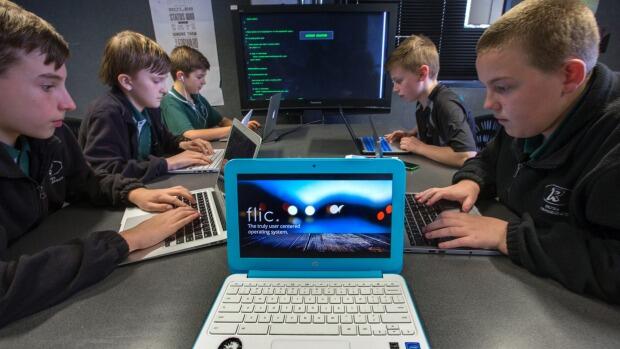Digital technology will soon be compulsory in schools from year 1 up, and teachers are excited about the new horizons, but say they need more resources.
Minister of Education Hekia Parata made the announcement in July and said consultation and design would start now, and the subject would be “fully integrated” in 2018.
Palmerston North’s Ross Intermediate School teacher Liam Rutherford said his school introduced digital devices for all students five years ago, and his class also had further digital learning topics.
Among them is the year 8 Flic group, who are developing an operating system.
Team member Fletcher Templeton said the project was challenging, but fun.
The group have a concept design they have pitched to industry professionals, and were looking forward to learning some basic coding next, to see if they could build what they had designed.
“It’s a bunch of code that runs your computer. It can send emails, and open and save files, and export,” Fletcher said.
Rutherford is enthusiastic about the diversity of topics and materials widely available for teaching digital technology. He is also excited about the engagement he sees in students working on digital technology projects, and the range of personal skills it can teach.
Introducing more digital technology is very achievable, even for teachers with no digital inclinations themselves, he said. The catch, however, is resources.
“I appreciate why take-up’s so slow – teachers need time for research and thinking time.
“The time to be able to do this workload is massive, and it depends what online facilities the school has; schools need [digital] resources and teachers need to be willing to change.”
While there was the potential for digital devices to be gimmicky in teaching, using them well offered “huge” potential for real learning benefits, he said.
Flic group member Jake Cook-Laskey said he had not learned much digital technology in primary school but was excited to be learning more now. Digital skills were important, he thought.
“In the future, probably most things will be digital, so it’s good to start learning about it.”
St Peter’s College digital technology teacher Stephan van Haren teaches students to set up networks, build mobile phone apps, create websites, and programme robots.
A robotics group he runs has been a runaway success, with students coming in during lunchtimes, after school and in holidays.The programme is extra-curricular, but gives the opportunity for students to earn unit standards.
“It involves programming … designing and redesigning, and they work in teams to compete, so it’s competitive but it’s collaborative.
“It’s amazing, it’s just such a hands-on, problem-solving, teamwork approach. In any subject you can think up projects, but having this hands-on competition is amazing for learning.”
He is helping other schools adopt similar programmes.
“Every classroom should have technology to use, but you get digital divides of haves and have nots, and that creates a further divide where people think they can’t use it because they haven’t had the opportunity.”
Digital skills would ultimately benefit society, he said.
“[Students] are all customers, they know how to use technology – what I want to teach them is for them to be producers.”
Source: Stuff











